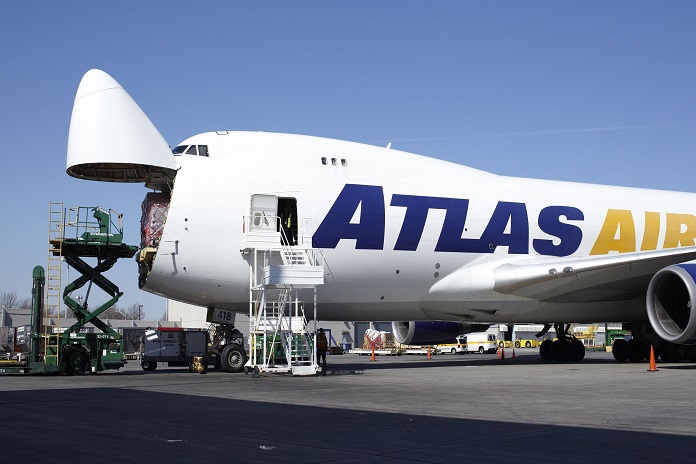
Atlas Air Worldwide Holdings, Inc. announced its first-quarter 2020 net income of $23.4 million compared with a reported loss of $29.7 million in the first quarter of 2019. Reported results in the first quarter of 2020 included an unrealised gain on outstanding warrants of $0.9 million, compared with an unrealised loss on outstanding warrants of $46.6 million in the year-ago period.
On an adjusted basis, EBITDA totalled $121.2 million in the first quarter this year compared with $120.4 million in the first quarter of 2019. Adjusted net income in the first quarter of 2020 totalled $29.9 million compared with $27.3 million in the prior-year period.
Volumes in the first quarter of 2020 totalled 73,247 block hours compared with 77,061 in the first quarter of 2019, with revenue of $643.5 million compared with $679.7 million in the prior-year period.
“Our thoughts are with everyone who has been affected by the Covid-19 pandemic. I would like to thank all of our employees and the frontline responders around the world for their tremendous efforts to combat this crisis,” said John W. Dietrich, president and chief executive officer, Atlas Air Worldwide.
Dietrich added, “Our results reflected increased charter cargo demand and higher airfreight yields in March. They also reflect the vital role that Atlas plays in supporting the global economy and our customers by keeping goods moving.
“From parts and components used in manufacturing processes to finished products, food, pharmaceuticals, supplies and other cargo, businesses and individuals count on Atlas.
“And we are grateful to be able to provide relief to businesses and communities in the fight against COVID-19. In addition to our commercial operations, we donated services to transport critical personal protective equipment and other necessary supplies to affected areas. We have also made several charitable contributions to organisations that help those in need.
“The strong demand for airfreight has carried into the second quarter. To meet that demand, we reactivated three of our 747 converted freighters that had been parked, and began operating a 777F that was previously in our dry-leasing business.”
Lower ACMI segment revenue in the first quarter of 2020 reflected a decrease in flying, primarily driven by the redeployment of 747-400 aircraft to the Charter segment as well as customer flight cancellations caused by the Covid-19 pandemic, partially offset by an increase in 777, 737 and 747-400 CMI flying.
Higher ACMI segment contribution was primarily due to an increase in CMI flying and a reduction in aircraft rent and depreciation, partially offset by the redeployment of 747-400 aircraft to the Charter segment. In addition, segment contribution was negatively impacted by the COVID-19 pandemic, which resulted in customers canceling flights and increased operating costs for us, including premium pay for crews operating in certain areas significantly impacted by the virus.
Higher Charter segment revenue during the period was primarily driven by increased flying, partially offset by a decrease in the average rate per block hour. Block-hour volume growth primarily reflected the strong demand for commercial cargo, driven by a reduction of available capacity in the market and the disruption of global supply chains due to the Covid-19 pandemic, and the redeployment of 747-400 aircraft from the ACMI segment. This was partially offset by lower AMC passenger flying as the military took precautionary measures to limit the movement of personnel. The lower average rate per block hour was primarily related to a reduction in Charter capacity purchased from ACMI customers that had no associated Charter block hours and lower fuel prices, partially offset by an increase in commercial cargo yields (excluding fuel).
Higher Charter segment contribution was primarily driven by an increase in commercial cargo yields (excluding fuel), reflecting a reduction of available capacity in the market and the disruption of global supply chains due to the Covid-19 pandemic. Segment contribution also benefited from lower aircraft rent and depreciation, and the redeployment of 747-400 aircraft from the ACMI segment. These improvements were partially offset by lower AMC passenger demand and increased operating costs, including premium pay for crews operating in certain areas impacted by Covid-19.
In Dry Leasing, lower segment revenue and contribution in the first quarter of 2020 primarily reflected that the prior-year quarter included $22.3 million ($17.9 million after tax) of revenue from maintenance payments related to the scheduled return of a 777 freighter.
Higher unallocated income and expenses, net, during the quarter primarily reflected an insurance recovery in the first quarter of 2019 and increased amortisation of a customer incentive asset.
Reported earnings in the first quarter of 2020 also included an effective income tax expense rate of 27.4 percent, due mainly to tax expense from the vesting of share-based compensation. On an adjusted basis, our results reflected an effective income tax rate of 24.2 percent.
Atlas Air expects that the earnings in the second quarter will benefit from continued charter demand, including several long-term charter programs at higher yields, driven by a reduction of airfreight capacity, increased demand for transporting goods and the disruption of global supply chains related to Covid-19; a refund of excess aircraft rent paid in previous years; flying the incremental CMI aircraft added to our fleet during 2019; and improved operating efficiencies and cost savings.










